Global Fintech Market, By Offering, By End User, By Region & Segmental Insights Trends and Forecast, 2024 – 2034
- Industry: Technology
- Report ID: TNR-110-1218
- Number of Pages: 420
- Table/Charts : Yes
- July, 2024
- Base Year : 2024
- No. of Companies : 10+
- No. of Countries : 29
- Views : 10231
- Covid Impact Covered: Yes
- War Impact Covered: Yes
- Formats : PDF, Excel, PPT
Fintech, or financial technology, uses technology to improve and automate financial services, including mobile banking, peer-to-peer lending, cryptocurrencies like blockchain, robo-advisors for investing, and payment systems. This market is rapidly growing due to advances in digital tech and changing consumer habits. It’s driven by the rise of digital payments, demand for efficient financial services, and support from regulators for tech innovation.
Key trends include AI and machine learning in finance, blockchain expanding beyond cryptocurrencies, and open banking. Opportunities lie in personalized financial services, better cybersecurity, and reaching underserved markets with new financial products. Drivers of growth include the move towards cashless societies, more internet and smartphone access, and partnerships between traditional banks and Fintech startups. As the sector matures, collaboration, adapting to regulations, and staying agile with technology will be crucial for continued Fintech innovation and growth. In Terms of Revenue, the Global Fintech Market was Worth US$ 265.5 Bn in 2023, Anticipated to Witness CAGR of 15.4% During 2024 – 2034.
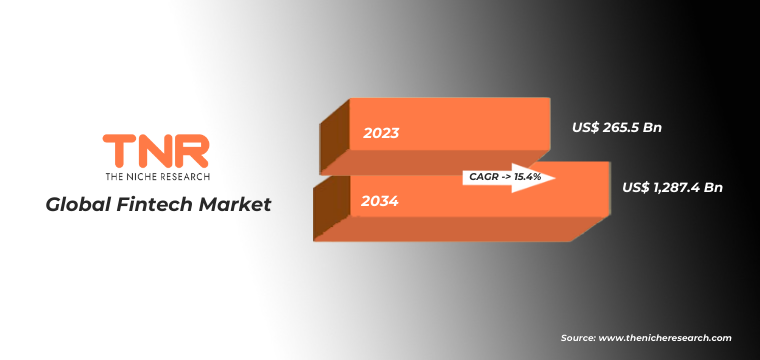
Trends in the Global Fintech Market
- Integration of AI and Machine Learning: These advancements are revolutionizing financial services by enabling more accurate risk assessment, personalized customer experiences through chatbots and virtual assistants, and predictive analytics for investment decisions. AI-driven algorithms are enhancing fraud detection capabilities and optimizing operational efficiency across various financial processes. As AI continues to evolve, Fintech companies are leveraging its capabilities to streamline operations, reduce costs, and deliver tailored financial solutions that cater to individual customer needs more effectively.
- Expansion of Blockchain Beyond Cryptocurrencies: Blockchain’s decentralized and secure nature is being harnessed in Fintech for improving transparency, efficiency, and security in various financial transactions, such as cross-border payments, trade finance, and smart contracts. Fintech startups and established financial institutions alike are exploring blockchain’s potential to reduce transaction costs, minimize fraud, and enhance the speed of transactions globally. This trend signifies a shift towards more robust and scalable blockchain solutions that could fundamentally transform how financial services are conducted, offering greater trust and reliability in digital transactions.
Blockchain and cryptocurrencies have captured a substantial share of the global fintech market, driven by their disruptive potential in enhancing security, transparency, and efficiency in financial transactions. Blockchain, as the underlying technology behind cryptocurrencies like Bitcoin and Ethereum, offers decentralized ledgers that enable secure peer-to-peer transactions without intermediaries. This technology promises reduced transaction costs, faster settlement times, and improved traceability across industries including banking, supply chain management, and insurance.
Cryptocurrencies, on the other hand, represent digital assets that utilize blockchain for secure transactions and are increasingly seen as alternative investments and mediums of exchange. Their appeal lies in borderless transactions, lower fees compared to traditional banking, and the potential for financial inclusion in underserved regions. Together, blockchain and cryptocurrencies continue to reshape the fintech landscape, attracting investment, fostering innovation, and challenging conventional financial systems worldwide.
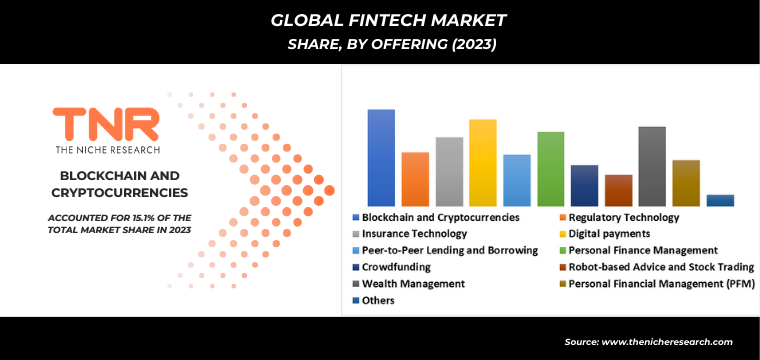
In 2023, consumers segment by end user category has emerged as the second-largest leading segment in the global fintech market. This segment encompasses a diverse range of fintech solutions aimed directly at individual consumers, including mobile banking apps, personal finance management tools, digital wallets, and investment platforms accessible to retail investors. The growth of this segment is driven by increasing consumer demand for convenient, personalized financial services that offer seamless digital experiences and competitive rates compared to traditional banking methods. Fintech companies are capitalizing on this trend by enhancing user interfaces, integrating AI for tailored recommendations, and expanding access to financial products that cater to diverse consumer needs globally.
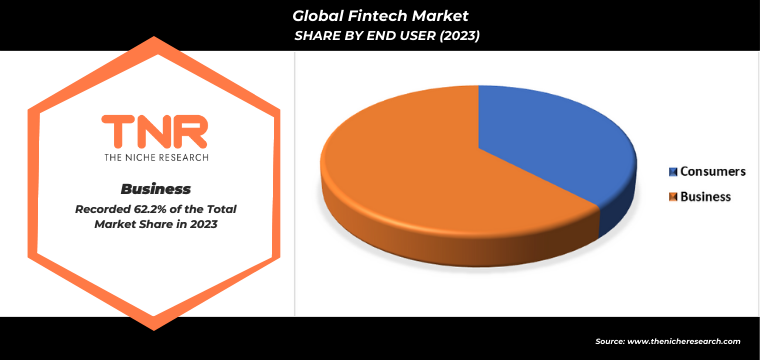
In 2023, North America asserted its dominance in the fintech market, emerging as the leading region, driven by robust technological infrastructure, a strong culture of innovation, and significant investment in financial technology. The region’s dominance is underpinned by a thriving ecosystem of fintech startups, established financial institutions embracing digital transformation, and supportive regulatory frameworks conducive to fintech innovation.
Major hubs like Silicon Valley, New York City, and Toronto continue to attract substantial venture capital funding, fostering a dynamic environment for fintech growth. North America’s leadership in fintech is also bolstered by widespread consumer adoption of digital payments, increasing demand for efficient financial services, and strategic partnerships between fintech firms and traditional banks. This position affirms North America’s pivotal role in shaping global fintech trends and driving forward innovations that redefine the future of finance.
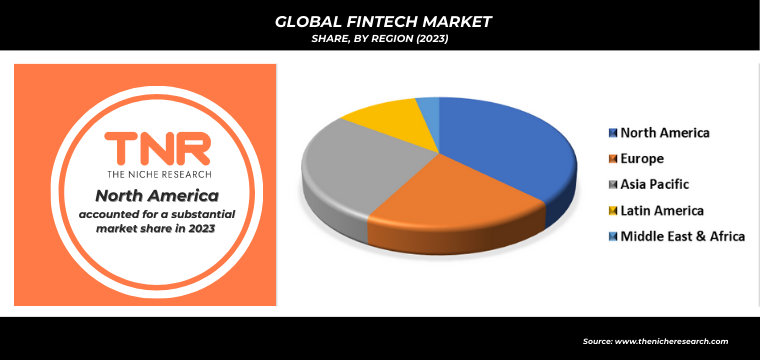
Competitive Landscape
Some of the players operating in the fintech market are
- Adyen
- Ant Group CO., Ltd.
- Block Inc. (Square)
- Fawry
- Finastra
- Fiserv, Inc.
- KE Holdings Inc.
- Lufax Holding
- MadfooatCom
- Mastercard
- Neo Mena Technologies Ltd.
- Optasia
- Plaid Inc.
- Rapyd Financial Network Ltd.
- Razorpray
- Stripe, Inc.
- Tencent
- Unicorn Payment Ltd.
- Other Industry Participants
Global Fintech Market Scope
| Report Specifications | Details |
| Market Revenue in 2023 | US$ 265.5 Bn |
| Market Size Forecast by 2034 | US$ 1,287.4 Bn |
| Growth Rate (CAGR) | 15.4% |
| Historic Data | 2016 – 2022 |
| Base Year for Estimation | 2023 |
| Forecast Period | 2024 – 2034 |
| Report Inclusions | Market Size & Estimates, Market Dynamics, Competitive Scenario, Trends, Growth Factors, Market Determinants, Key Investment Segmentation, Product/Service/Solutions Benchmarking |
| Segments Covered | By Offering, By End User, By Region |
| Regions Covered | North America, Europe, Asia Pacific, Middle East & Africa, Latin America |
| Countries Covered | U.S., Canada, Mexico, Rest of North America, France, The UK, Spain, Germany, Italy, Nordic Countries (Denmark, Finland, Iceland, Sweden, Norway), Benelux Union (Belgium, The Netherlands, Luxembourg), Rest of Europe, China, Japan, India, New Zealand, Australia, South Korea, Southeast Asia (Indonesia, Thailand, Malaysia, Singapore, Rest of Southeast Asia), Rest of Asia Pacific, Saudi Arabia, UAE, Egypt, Kuwait, South Africa, Rest of Middle East & Africa, Brazil, Argentina, Rest of Latin America |
| Key Players | Adyen, Ant Group CO., Ltd., Block Inc. (Square), Fawry, Finastra, Fiserv, Inc., KE Holdings Inc , Lufax Holding, MadfooatCom, Mastercard, Neo Mena Technologies Ltd., Optasia, Plaid Inc., Rapyd Financial Network Ltd., Razorpray, Stripe, Inc., Tencent, Unicorn Payment Ltd. |
| Customization Scope | Customization allows for the inclusion/modification of content pertaining to geographical regions, countries, and specific market segments. |
| Pricing & Procurement Options | Explore purchase options tailored to your specific research requirements |
| Contact Details | Consult With Our Expert
Japan (Toll-Free): +81 663-386-8111 South Korea (Toll-Free): +82-808- 703-126 Saudi Arabia (Toll-Free): +966 800-850-1643 United Kingdom: +44 753-710-5080 United States: +1 302-232-5106 E-mail: askanexpert@thenicheresearch.com
|
Global Fintech Market
By Offering
- Blockchain and Cryptocurrencies
- Regulatory Technology
- Insurance Technology
- Digital payments
- Peer-to-Peer Lending and Borrowing
- Personal Finance Management
- Crowdfunding
- Robot-based Advice and Stock Trading
- Wealth Management
- Personal Financial Management (PFM)
- Others
By End User
- Consumers
- Business
- Small and Medium-sized Enterprises (SMEs)
- Large Enterprises
By Region
- North America (U.S., Canada, Mexico, Rest of North America)
- Europe (France, The UK, Spain, Germany, Italy, Nordic Countries (Denmark, Finland, Iceland, Sweden, Norway), Benelux Union (Belgium, The Netherlands, Luxembourg), Rest of Europe)
- Asia Pacific (China, Japan, India, New Zealand, Australia, South Korea, Southeast Asia (Indonesia, Thailand, Malaysia, Singapore, Rest of Southeast Asia), Rest of Asia Pacific)
- Middle East & Africa (Saudi Arabia, UAE, Egypt, Kuwait, South Africa, Rest of Middle East & Africa)
- Latin America (Brazil, Argentina, Rest of Latin America)
Report Layout:
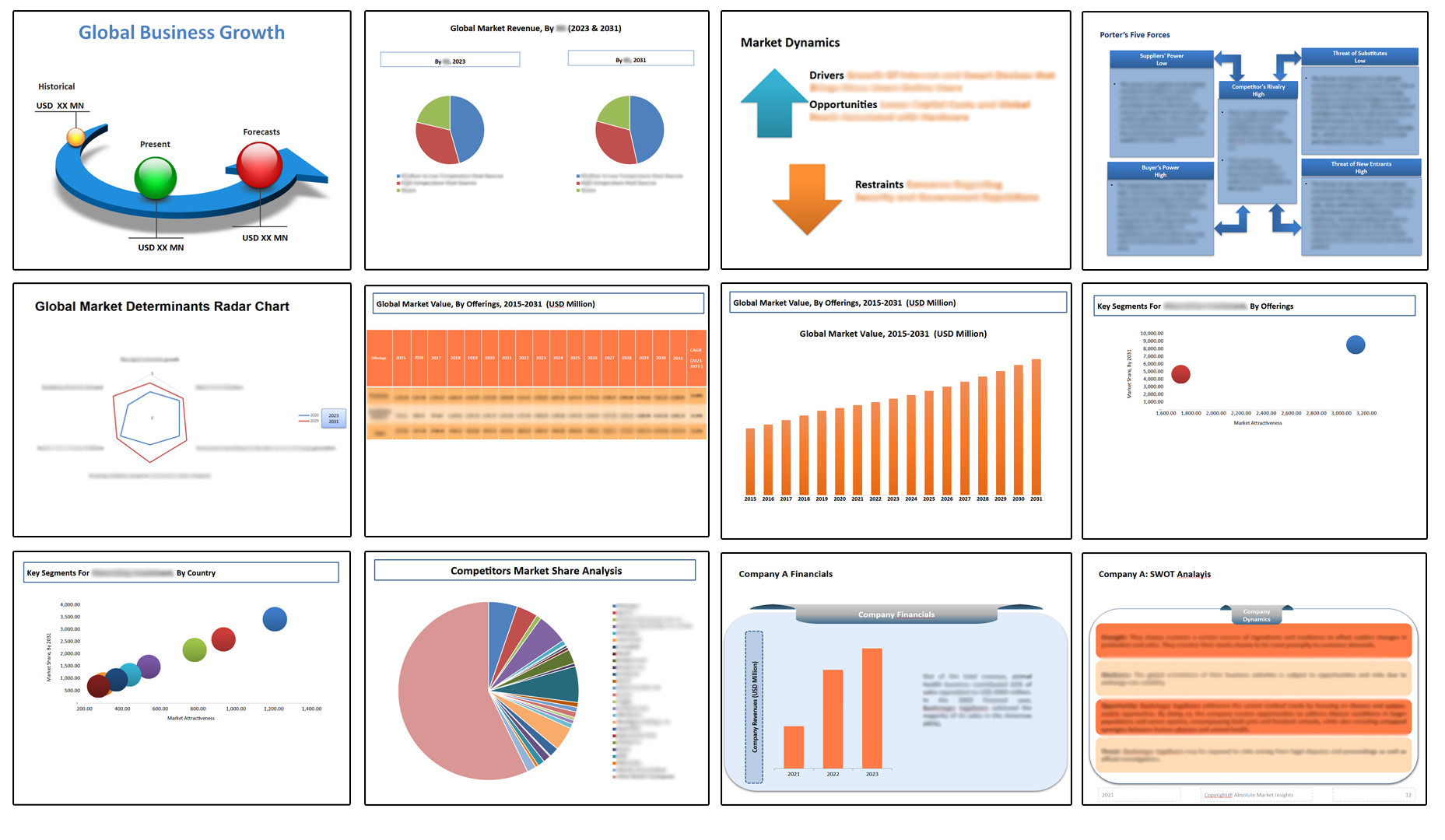
Table of Contents
Note: This ToC is tentative and can be changed according to the research study conducted during the course of report completion.
**Exclusive for Multi-User and Enterprise User.
Global Fintech Market
By Offering
- Blockchain and Cryptocurrencies
- Regulatory Technology
- Insurance Technology
- Digital payments
- Peer-to-Peer Lending and Borrowing
- Personal Finance Management
- Crowdfunding
- Robot-based Advice and Stock Trading
- Wealth Management
- Personal Financial Management (PFM)
- Others
By End User
- Consumers
- Business
- Small and Medium-sized Enterprises (SMEs)
- Large Enterprises
By Region
- North America (U.S., Canada, Mexico, Rest of North America)
- Europe (France, The UK, Spain, Germany, Italy, Nordic Countries (Denmark, Finland, Iceland, Sweden, Norway), Benelux Union (Belgium, The Netherlands, Luxembourg), Rest of Europe)
- Asia Pacific (China, Japan, India, New Zealand, Australia, South Korea, Southeast Asia (Indonesia, Thailand, Malaysia, Singapore, Rest of Southeast Asia), Rest of Asia Pacific)
- Middle East & Africa (Saudi Arabia, UAE, Egypt, Kuwait, South Africa, Rest of Middle East & Africa)
- Latin America (Brazil, Argentina, Rest of Latin America)
The Niche Research approach encompasses both primary and secondary research methods to provide comprehensive insights. While primary research is the cornerstone of our studies, we also incorporate secondary research sources such as company annual reports, premium industry databases, press releases, industry journals, and white papers.
Within our primary research, we actively engage with various industry stakeholders, conducting paid interviews and surveys. Our meticulous analysis extends to every market participant in major countries, allowing us to thoroughly examine their portfolios, calculate market shares, and segment revenues.
Our data collection primarily focuses on individual countries within our research scope, enabling us to estimate regional market sizes. Typically, we employ a bottom-up approach, meticulously tracking trends in different countries. We analyze growth drivers, constraints, technological innovations, and opportunities for each country, ultimately arriving at regional figures.Our process begins by examining the growth prospects of each country. Building upon these insights, we project growth and trends for the entire region. Finally, we utilize our proprietary model to refine estimations and forecasts.
Our data validation standards are integral to ensuring the reliability and accuracy of our research findings. Here’s a breakdown of our data validation processes and the stakeholders we engage with during our primary research:
- Supply Side Analysis: We initiate a supply side analysis by directly contacting market participants, through telephonic interviews and questionnaires containing both open-ended and close-ended questions. We gather information on their portfolios, segment revenues, developments, and growth strategies.
- Demand Side Analysis: To gain insights into adoption trends and consumer preferences, we reach out to target customers and users (non-vendors). This information forms a vital part of the qualitative analysis section of our reports, covering market dynamics, adoption trends, consumer behavior, spending patterns, and other related aspects.
- Consultant Insights: We tap into the expertise of our partner consultants from around the world to obtain their unique viewpoints and perspectives. Their insights contribute to a well-rounded understanding of the markets under investigation.
- In-House Validation: To ensure data accuracy and reliability, we conduct cross-validation of data points and information through our in-house team of consultants and utilize advanced data modeling tools for thorough verification.
The forecasts we provide are based on a comprehensive assessment of various factors, including:
- Market Trends and Past Performance (Last Five Years): We accurately analyze market trends and performance data from preceding five years to identify historical patterns and understand the market’s evolution.
- Historical Performance and Growth of Market Participants: We assess the historical performance and growth trajectories of key market participants. This analysis provides insights into the competitive landscape and individual company strategies.
- Market Determinants Impact Analysis (Next Eight Years): We conduct a rigorous analysis of the factors that are projected to influence the market over the next eight years. This includes assessing both internal and external determinants that can shape market dynamics.
- Drivers and Challenges for the Forecast Period:Identify the factors expected to drive market growth during the forecast period, as well as the challenges that the industry may face. This analysis aids in deriving an accurate growth rate projection.
- New Acquisitions, Collaborations, or Partnerships: We keep a close watch on any new acquisitions, collaborations, or partnerships within the industry. These developments can have a significant impact on market dynamics and competitiveness.
- Macro and Micro Factors Analysis:A thorough examination of both macro-level factors (e.g., economic trends, regulatory changes) and micro-level factors (e.g., technological advancements, consumer preferences) that may influence the market during the forecast period.
- End-User Sentiment Analysis: To understand the market from the end-user perspective, we conduct sentiment analysis. This involves assessing the sentiment, preferences, and feedback of the end-users, which can provide valuable insights into market trends.
- Perspective of Primary Participants: Insights gathered directly from primary research participants play a crucial role in shaping our forecasts. Their perspectives and experiences provide valuable qualitative data.
- Year-on-Year Growth Trend: We utilize a year-on-year growth trend based on historical market growth and expected future trends. This helps in formulating our growth projections, aligning them with the market’s historical performance.
Research process adopted by TNR involves multiple stages, including data collection, validation, quality checks, and presentation. It’s crucial that the data and information we provide add value to your existing market understanding and expertise. We have also established partnerships with business consulting, research, and survey organizations across regions and globally to collaborate on regional analysis and data validation, ensuring the highest level of accuracy and reliability in our reports.









